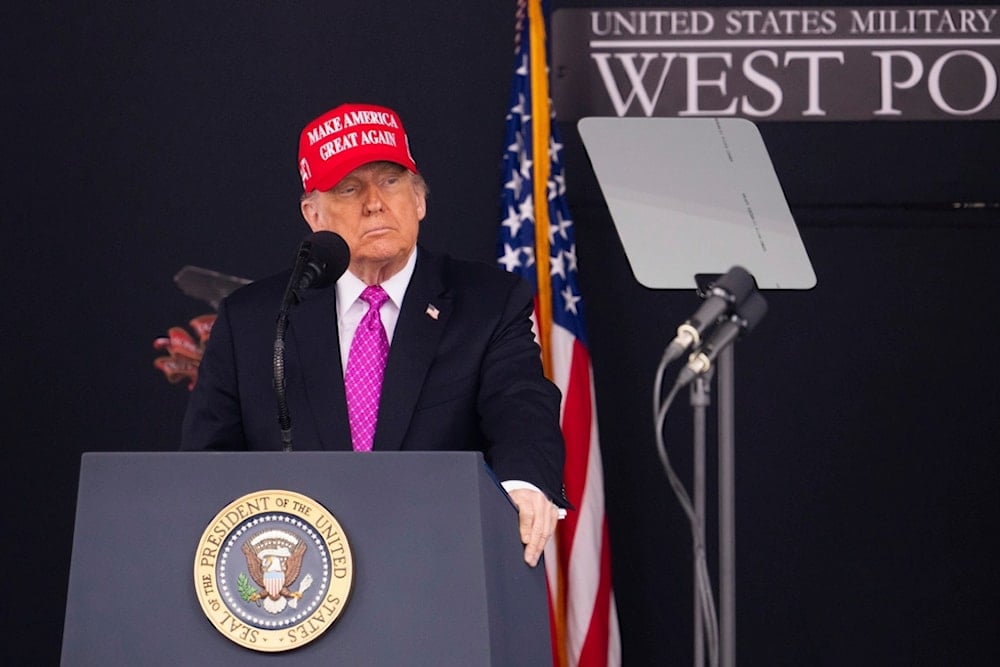Trump signals new 'golden-age' in expanded US-Gulf partnership
US President Donald Trump's second-term strategy elevates Gulf nations as strategic hubs, pivoting US foreign policy toward high-tech partnerships, transactional alliances, and a shared anti-Iran agenda.
-

President Donald Trump speaks to United States Military Academy graduating cadets during commencement ceremonies in West Point, New York, Saturday, May 24, 2025 (AP)
In a landmark visit to the Gulf last week, US President Donald Trump declared from Saudi Arabia that he had “launched America’s golden age,” adding that “the Middle East’s golden age can advance with us.”
The statement marked a significant reorientation in US foreign policy. With massive sovereign wealth funds and centralized leadership allowing for rapid decision-making, the Gulf, particularly Saudi Arabia, Qatar, and the UAE, has become a far more appealing partner for Washington under Trump’s second term.
Unlike his inaugural foreign trip in 2017, which prioritized defense deals, Trump’s 2025 tour expanded in both scope and ambition. It underscored a recalibrated American approach centered on high-tech cooperation and transactional pragmatism, situating the Gulf as a central player in a new model of geopolitical partnership.
Shared priorities, incentives
These partnerships are shaped by economic incentives and shared strategic priorities: curbing Iran’s nuclear ambitions, containing its regional influence, ensuring regional stability, and securing energy markets and maritime routes.
This shift reflects a deliberate US pivot toward the Gulf as a technology and investment frontier, which officials describe as the next battlefield in the rivalry with China. In Trump’s global hierarchy, the Gulf is no longer merely a host to US military assets but the new frontline of economic power.
Rather than relying on traditional allies like the UK or “Israel,” the Trump administration is fostering alliances with resource-rich, politically stable partners capable of delivering reliable governance and high returns on American investment. The Gulf, in this vision, is no longer a client but rather a collaborator.
A 'golden age'
Framed as a “golden age,” the strategy emphasizes strategic utility, mutual benefit, and reduced conditionality. It favors measurable returns on regional investments over democratic evangelism, resonating more deeply with Gulf leaderships who seek recognition as regional architects rather than subordinate actors.
Coupled with what some observers see as a symbolic downgrading of “Israel’s” centrality in US regional strategy, Trump’s approach signals a more pragmatic posture. Washington’s Gulf ties, while not abandoning old allies, now prioritize tangible benefits over ideological alignment.
Shift in US foreign policy
The New York Times reported Sunday that Trump’s recent Gulf tour marked a notable shift in US foreign policy in the region, emphasizing new alliances and strategies that largely left "Israel" on the sidelines.
At the Saudi royal palace, Trump met with Syria’s new defacto leader, Ahmad al-Sharaa, and announced the lifting of longstanding US sanctions on Damascus.
“Tough guy, very strong past,” Trump said of al-Sharaa, who has a history of ties with Al-Qaeda. The US president justified the move by stating he wanted "to give them a chance at greatness."
But "Israel’s" leadership has strongly opposed any recognition of the new Syrian administration. Israeli Prime Minister Benjamin Netanyahu's government has labeled al-Sharaa a “jihadist” and has warned against US normalization with Damascus.
Netanyahu left out of key US regional moves
Despite years of close cooperation, Trump’s actions reflect a broader Trump-Netanyahu relations reset. While the White House maintains that ties with "Israel" remain intact, Trump's refusal to coordinate key decisions with Netanyahu has not gone unnoticed.
“No not at all,” Trump said when asked if he was sidelining "Israel". “This is good for Israel, having a relationship like I have with these countries, Middle Eastern countries, essentially all of them.”
But Trump sidelining "Israel" has been a recurring theme on this trip. The US president focused his efforts on securing economic agreements and peace talks in the Gulf, visiting Saudi Arabia, Qatar, and the United Arab Emirates, while skipping a stop in "Israel" altogether.
“The overall sense is of shifting attention and perception of interest, mainly to the Gulf States, where the money is,” indicated Itamar Rabinovich, a former Israeli ambassador to the United States.

 4 Min Read
4 Min Read










